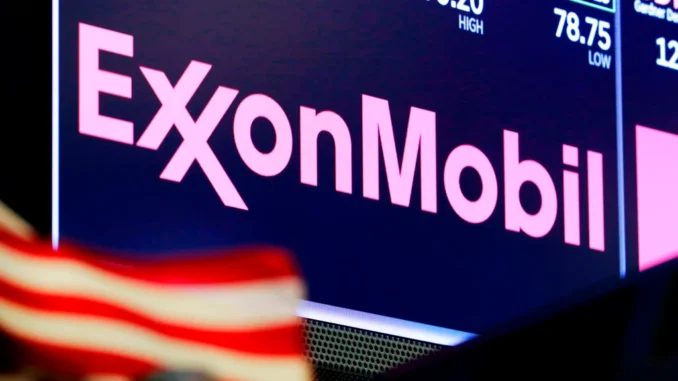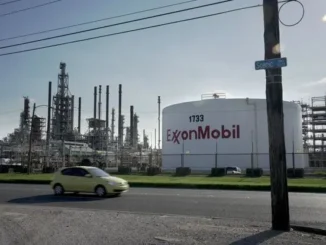
is closing in on a deal to buy
, a blockbuster takeover that could be worth roughly $60 billion and reshape the U.S. oil industry.
A deal could be sealed as soon as in the coming days, though it is still possible there won’t be one, people familiar with the matter said.
After posting a record profit in 2022, Exxon has been flush with cash and exploring options that would push it deeper into West Texas shale.
An acquisition of Pioneer, with a market cap of around $50 billion, would likely be Exxon’s largest deal since its megamerger with Mobil in 1999. It would give Exxon a dominant position in the oil-rich Permian Basin of West Texas and New Mexico, a region the oil giant has said is integral to its growth plans.
The Wall Street Journal reported in April that the two companies were holding preliminary talks.
Exxon has a market value of $436 billion, so the deal, which would be the biggest takeover of the year, should be easily doable.
A deal would eclipse the U.S. oil industry’s most recent blockbuster,
’s 2019 acquisition of Anadarko Petroleum for about $38 billion, and top Exxon’s 2010 purchase of XTO Energy for more than $30 billion.
It would also be a legacy-shaping move for Exxon CEO Darren Woods, whose tenure at the company has seen its peaks and valleys.
Woods, an Exxon-lifer who became CEO in 2017, initially promised to dramatically grow Exxon’s oil production only to see his plans felled by the pandemic. An oil-market collapse in 2020 led to Exxon’s first annual loss in decades—more than $22 billion. It lost a historic proxy fight in 2021 to investment firm Engine No. 1, which excoriated Exxon’s finances and argued it had no long-term strategy.
But Exxon rebounded to a record profit of $55.7 billion last year, buoyed by soaring global demand for oil and gas as economies reopened. Exxon has used its prolific cash flows to reward investors with buybacks and dividends and pledged disciplined spending, though many wondered whether the company would dip into its coffers for a megadeal in the oil patch.
The acquisition marks Woods’s second significant acquisition, coming only a few months after Exxon scooped up CO2 pipeline operator
for $4.9 billion. It would add vast swaths of West Texas acreage considered the core of the U.S. shale boom.
Pioneer’s acreage in the Midland Basin—the eastern portion of the Permian Basin, which straddles West Texas and New Mexico—is seen as one of the largest collections of fertile oil land in the U.S., and the company holds one of the largest numbers of untapped drilling locations of any Permian player, analysts have said.
In the wake of the pandemic, Pioneer snapped up two other large Permian operators, Parsley Energy and DoublePoint Energy, for a combined $11 billion in 2021.
Pioneer’s CEO, Scott Sheffield, started work for predecessor company, Parker & Parsley Petroleum, in 1979. That company merged with another in 1997 to form Pioneer. He had retired in 2016 but returned to the job in 2019.
In April, Sheffield had announced he would retire at the end of this year, and that he would be succeeded by his longtime top lieutenant Richard Dealy, the company’s chief operating officer.
“I’m almost 71, we celebrated Pioneer’s 25th anniversary last year,” Sheffield told The Wall Street Journal in an interview in April. “And so [the] timing was right.”
Pioneer’s balance sheet has been in increasingly good shape since oil prices surged, with its debt declining by more than 20% since the end of 2021, according to FactSet.
The tie-up could presage a wave of consolidation among shale companies. The industry has shifted from the rapid growth it pursued for more than a decade to a mature business underpinned by fiscal restraint and hefty investor payouts. But producers are contending with dwindling drilling locations. Drilling for new oil discoveries has fallen out of favor with investors, leaving many companies with few options other than to acquire rivals to extend their runway.
Producers have deep coffers at their disposal to pursue deals after Russia’s invasion of Ukraine last year sent global prices soaring to more than $127 a barrel. Prices have retreated and been volatile since then. Exxon’s acquisition of Pioneer could be the first of a series of deals in the Permian, which contains shale wells that produce rapidly and don’t bind companies to decadeslong megaprojects that have fallen out of favor with some investors who fear a future decline in oil demand.
Environmentalists, lawmakers and others have hoped oil and gas companies would invest their record profits into green energy. Woods has pledged Exxon will invest $17 billion through 2027 in cutting the company’s carbon emissions and building a business that would help other companies reduce theirs too, investing in areas including carbon capture, biofuels and lithium mining.
Exxon’s move to purchase Pioneer, even after its acquisition of Denbury, the CO2 pipeline operator, signals the company is still primarily planning to lean on its traditional oil-and-gas business for decades.



